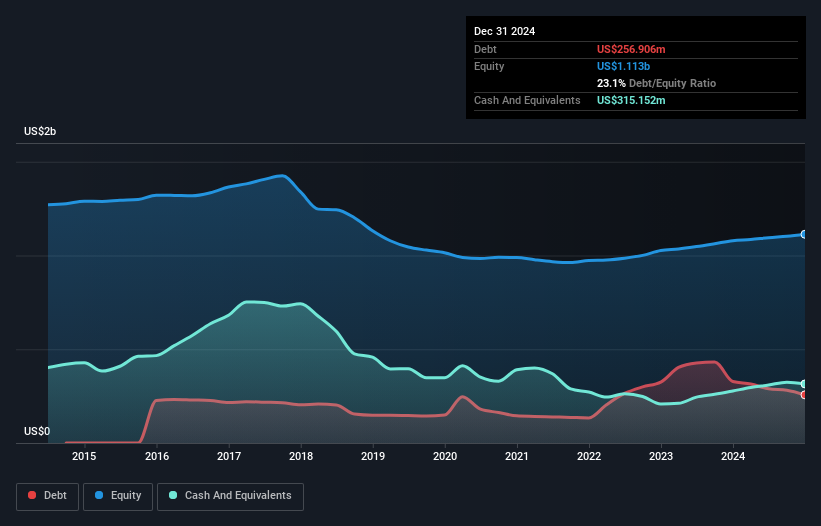
Warren Buffett famously said, 'Volatility is far from synonymous with risk.' So it might be obvious that you need to consider debt, when you think about how risky any given stock is, because too much debt can sink a company. We note that Benchmark Electronics, Inc. (NYSE:BHE) does have debt on its balance sheet. But should shareholders be worried about its use of debt?
What Risk Does Debt Bring?
Debt assists a business until the business has trouble paying it off, either with new capital or with free cash flow. In the worst case scenario, a company can go bankrupt if it cannot pay its creditors. While that is not too common, we often do see indebted companies permanently diluting shareholders because lenders force them to raise capital at a distressed price. Of course, debt can be an important tool in businesses, particularly capital heavy businesses. When we examine debt levels, we first consider both cash and debt levels, together.
What Is Benchmark Electronics's Net Debt?
The image below, which you can click on for greater detail, shows that Benchmark Electronics had debt of US$256.9m at the end of December 2024, a reduction from US$328.1m over a year. However, its balance sheet shows it holds US$315.2m in cash, so it actually has US$58.2m net cash.

A Look At Benchmark Electronics' Liabilities
We can see from the most recent balance sheet that Benchmark Electronics had liabilities of US$649.1m falling due within a year, and liabilities of US$377.1m due beyond that. Offsetting these obligations, it had cash of US$315.2m as well as receivables valued at US$581.7m due within 12 months. So its liabilities outweigh the sum of its cash and (near-term) receivables by US$129.3m.
Of course, Benchmark Electronics has a market capitalization of US$1.27b, so these liabilities are probably manageable. But there are sufficient liabilities that we would certainly recommend shareholders continue to monitor the balance sheet, going forward. Despite its noteworthy liabilities, Benchmark Electronics boasts net cash, so it's fair to say it does not have a heavy debt load!
View our latest analysis for Benchmark Electronics
While Benchmark Electronics doesn't seem to have gained much on the EBIT line, at least earnings remain stable for now. When analysing debt levels, the balance sheet is the obvious place to start. But ultimately the future profitability of the business will decide if Benchmark Electronics can strengthen its balance sheet over time. So if you're focused on the future you can check out this free report showing analyst profit forecasts.
Finally, while the tax-man may adore accounting profits, lenders only accept cold hard cash. Benchmark Electronics may have net cash on the balance sheet, but it is still interesting to look at how well the business converts its earnings before interest and tax (EBIT) to free cash flow, because that will influence both its need for, and its capacity to manage debt. In the last three years, Benchmark Electronics created free cash flow amounting to 8.5% of its EBIT, an uninspiring performance. For us, cash conversion that low sparks a little paranoia about is ability to extinguish debt.
Summing Up
Although Benchmark Electronics's balance sheet isn't particularly strong, due to the total liabilities, it is clearly positive to see that it has net cash of US$58.2m. So we don't have any problem with Benchmark Electronics's use of debt. Of course, we wouldn't say no to the extra confidence that we'd gain if we knew that Benchmark Electronics insiders have been buying shares: if you're on the same wavelength, you can find out if insiders are buying by clicking this link.
When all is said and done, sometimes its easier to focus on companies that don't even need debt. Readers can access a list of growth stocks with zero net debt 100% free, right now.
Have feedback on this article? Concerned about the content? Get in touch with us directly. Alternatively, email editorial-team (at) simplywallst.com.
This article by Simply Wall St is general in nature. We provide commentary based on historical data and analyst forecasts only using an unbiased methodology and our articles are not intended to be financial advice. It does not constitute a recommendation to buy or sell any stock, and does not take account of your objectives, or your financial situation. We aim to bring you long-term focused analysis driven by fundamental data. Note that our analysis may not factor in the latest price-sensitive company announcements or qualitative material. Simply Wall St has no position in any stocks mentioned.